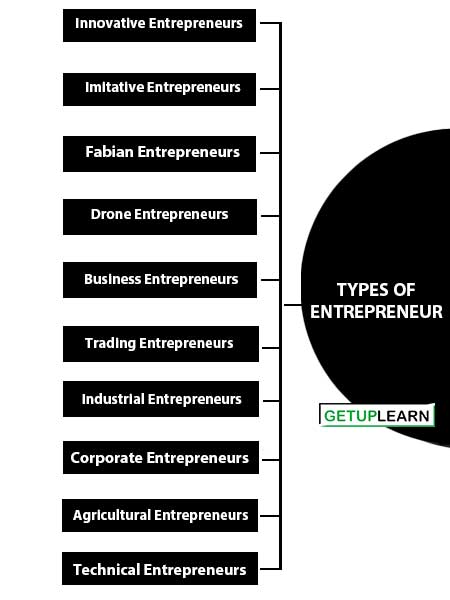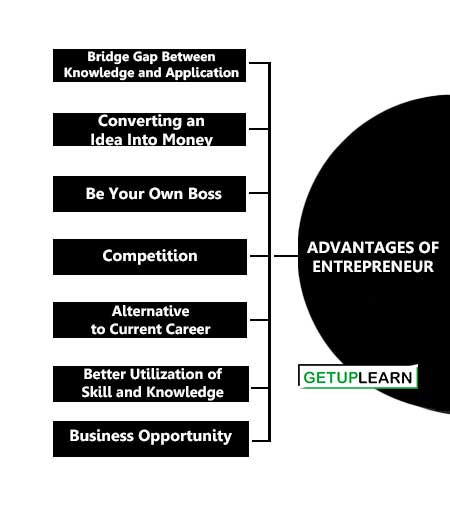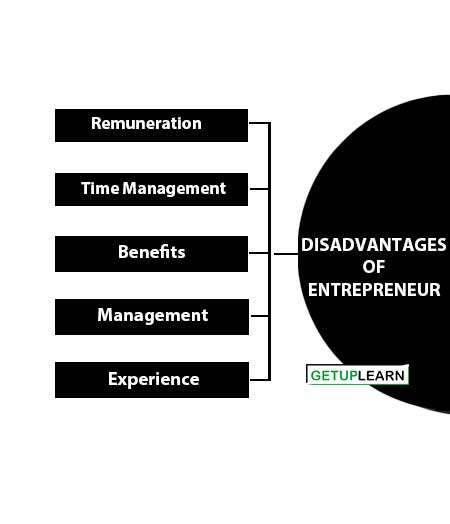Table of Contents
- 1 What is an Entrepreneur?
- 2 Definitions of Entrepreneur
- 3 Characteristics of Entrepreneur
-
4 Types of Entrepreneur
- 4.1 Innovative Entrepreneurs
- 4.2 Imitative Entrepreneurs
- 4.3 Fabian Entrepreneurs
- 4.4 Drone Entrepreneurs
- 4.5 Business Entrepreneurs
- 4.6 Trading Entrepreneurs
- 4.7 Industrial Entrepreneurs
- 4.8 Corporate Entrepreneurs
- 4.9 Agricultural Entrepreneurs
- 4.10 Technical Entrepreneurs
- 4.11 Non-Technical Entrepreneurs
- 4.12 Professional Entrepreneurs
- 4.13 Spontaneous Entrepreneurs
- 4.14 Induced Entrepreneurs
- 4.15 Motivated Entrepreneurs
- 5 Advantages of Entrepreneur
- 6 Disadvantages of Entrepreneur
- 7 FAQs Section
What is an Entrepreneur?
An entrepreneur is a person who puts together capital and labor and converts his idea into a reality Different entrepreneurs in their own ways contribute to the economy of the country some entrepreneurs are self-motivated while some are business entrepreneurs. This gives to various types of entrepreneurs.

In other words, An entrepreneur is someone who has the ability and desire to establish, administer, and succeed in a startup venture, make profits, and bear the risk associated with starting and running a business.
A prominent example of entrepreneurship is the starting of a new business venture. Entrepreneurs are generally known as a source of new ideas or innovators. They are also the ones who introduce new ideas in the form of products in the market by replacing old products with some new invention or feature addition.
Definitions of Entrepreneur
These are the definitions of entrepreneur by authors:
An entrepreneur is “A person who sets up a business or businesses, taking on financial risks in the hope of profit”
Oxford Dictionary
An entrepreneur is an ‘agent’ who buys means of production at certain prices in order to combine them into a product which he is going to sell at prices that are uncertain.
Cantilon
A specialized group or persons who bear ‘risks’ and meet the uncertainty.
Frank Knight
The entrepreneur is a person who shifts economic resources out of an area of lower and into an area of higher productivity and greater yield.
J. B. Say
Entrepreneur is an individual who ‘adventures’ or ‘undertakes’ risks, who brings together the capital and labour required for the work, who arranges or engineers its general plan, and who supritends its minor details.
Alfred Marshall
Characteristics of Entrepreneur
The characteristics of an entrepreneur are explained below:
- Mental Ability
- Risk Taking
- Innovative
- Human Relations Ability
- Achievement Motivation
- Communication Skills
- Commitment and Conviction
- Business Conviction
- Prudence
- Clarity of Objectives
Mental Ability
An entrepreneur should be able to analyze various problems and situations in order to deal with them effectively therefore it is essential that he must be creative and Intelligent.
Risk Taking
He should neither take risks that are easily achievable nor those that are highly impossible to achieve. In other words, he should be a moderate and a calculative risk taker.
Innovative
He should always be innovative so as to satisfy the demand of the customers they should also ensure that he is able to imitate research and introduce new goods and Services.
Human Relations Ability
An entrepreneur should possess emotional stability so that he can maintain Cordial relations with all those with whom he deals e.g.: Customers, Employees, Shareholders, dealers, etc.
Achievement Motivation
This is the most important characteristic of an entrepreneur as he should essentially have the desire to achieve both individual and organizational goods.
Communication Skills
The Secret to the success of most entrepreneurs is their effective skills of communication it helps them to put their points and thoughts in an effective and understandable manner across people.
Commitment and Conviction
He should be committed to the project and should be at peace only when the goal is achieved. He should have had a strong conviction and should have no effort to complete the task as desired.
Business Conviction
He should be able to maintain and guard all his business secrets. It is here that the Selection of subordinates plays a very important role. The breakage of any business secret to competitors will definitely lead to a downfall in his own business.
Prudence
An entrepreneur should be prudent in all his dealings and should be able to see and work out details from all angles. At the same time he should be able to access all the favorable factors identify the pitfalls and take suitable measures to overcome them.
Clarity of Objectives
An entrepreneur should have clarity of objectives i.e., he should be able to list Down his goals and objectives and work towards achieving the same.
Types of Entrepreneur
Extreme diversity is found in the personality, nature, ability, and attitude of the entrepreneur. Hence entrepreneurs can also be of different types. Entrepreneurs can be classified on various grounds. Some of the major types of entrepreneurs are as follows:
- Innovative Entrepreneurs
- Imitative Entrepreneurs
- Fabian Entrepreneurs
- Drone Entrepreneurs
- Business Entrepreneurs
- Trading Entrepreneurs
- Industrial Entrepreneurs
- Corporate Entrepreneurs
- Agricultural Entrepreneurs
- Technical Entrepreneurs
- Non-Technical Entrepreneurs
- Professional Entrepreneurs
- Spontaneous Entrepreneurs
- Induced Entrepreneurs
- Motivated Entrepreneurs

Innovative Entrepreneurs
Innovative entrepreneurs are those who introduce new products, and new methods of production techniques or discover a new market or new services, etc. They are commonly found in developed countries. They are aggressive in nature and they always try to make the idea successful.
Imitative Entrepreneurs
This type of entrepreneur always tries to copy the innovations made by innovative entrepreneurs. They are organizers of factors of production rather than creators. They contribute to the underdeveloped countries. They are adaptive and more flexible.
Fabian Entrepreneurs
Fabian Entrepreneurs are very shy a lazy. They are very cautious. They do not venture or take risks. They are rigid and fundamental in their approach. they follow the footsteps of their predecessors.
Drone Entrepreneurs
This type of entrepreneur is conventional in their approach. They refuse to copy or use opportunities that come their way. They are not ready to make changes in their existing production methods even if they suffer losses. They resist changes.
Business Entrepreneurs
Business entrepreneurs are those who develop an idea for a new product or service and then establish an enterprise to produce products according to their ideas. Most of the entrepreneurs belong to this category.
Trading Entrepreneurs
They undertake trading activities whether domestic or foreign trade. They have to identify the potential market for their products in order to stimulate the demand for products. They use many techniques to promote trading.
Industrial Entrepreneurs
They essentially manufacture products and offer services, which have an effective demand in the market. They have the ability to convert economic resources and technology into a profitable venture.
Corporate Entrepreneurs
They are those who through their innovative ideas and skills able to organize, manage, and control a corporate undertaking very effectively and efficiently. Usually, they are promoters of the undertaking/corporations, engaged in business, trade, or industry.
Agricultural Entrepreneurs
Those who undertake agricultural as well as allied activities in the field of agriculture are known as agricultural Entrepreneurs. They engage in the raising and marketing of crops, fertilizers, and other inputs of agriculture through the employment of modern techniques, machines, and irrigation.
Technical Entrepreneurs
Entrepreneurs who are technical by nature in the sense of having the capability of developing new and improved quality of goods and services out of their own knowledge, skill, and specialization are called technical Entrepreneurs. They concentrate more on production than marketing.
Non-Technical Entrepreneurs
Non-technical entrepreneurs are those who are mainly concerned with developing alternative marketing and distribution strategies to promote their businesses. They are not concerned with the technical aspects of the products and services they are dealing with.
Professional Entrepreneurs
They make their profession to establish business enterprises with a purpose, to sell them once they are established. He or she is always looking forward to developing alternative projects by selling the running business. He is not interested in managing the operations of the business established by him. He or she is very dynamic.
Spontaneous Entrepreneurs
They are otherwise known as pure Entrepreneurs, who are motivated by their desire for self-fulfillment and to achieve or prove their excellence in job performance. They undertake entrepreneurial activities for their personal satisfaction in work, ego, or status. Their strength lies in their creative abilities. They are the natural Entrepreneurs in any society.
Induced Entrepreneurs
They enter into entrepreneurship because of various governmental supports provided in terms of financial assistance, incentives, concessions, and other facilities to the people who want to set up their Enterprises.
Motivated Entrepreneurs
They are motivated by their desire to make use of their technical and professional expertise and skill in performing the job or project they have taken up. They have enough confidence in their abilities. they are highly ambitious and are normally not satisfied by the slow progress in their jobs.
Advantages of Entrepreneur
These are the important advantages of entrepreneurs:
- Bridge Gap Between Knowledge and Application
- Converting an Idea Into Money
- Be Your Own Boss
- Competition
- Alternative to Current Career
- Better Utilization of Skill and Knowledge
- Business Opportunity

Bridge Gap Between Knowledge and Application
An entrepreneur is one who is interested in applying the knowledge acquired through education for the benefit of the society i.e., he takes a risk and converts his knowledge into an economic activity and tries to gain maximum out of it.
Converting an Idea Into Money
An entrepreneur brings dynamic creativity and skill and possesses the ability to take calculated risks and convert his innovative ideas into reality. Besides making society more enjoyable he gets economic gain by converting his idea into reality.
Be Your Own Boss
There are some people who like an independent life, possess a high capacity to take risks, and are adventurous by nature. These personal trades encourage an individual to become an entrepreneur and start his own business.
Competition
By adapting to innovative ideas an entrepreneur is able to produce a product or service at a low cost. This facilitates the organization to face competition in the market and at the same time provide a variety and quality of services to society.
Alternative to Current Career
People with entrepreneurial skills at times are found working for others for reasons best known to them. They are called entrepreneurs.
Out of frustration and Dissatisfaction, they prefer changing their position from employee to employer thus, if an opportunity comes their way people with entrepreneurial skills will have business as an alternative to their present career.
Better Utilization of Skill and Knowledge
Several people possess entrepreneurial skills but are hesitant to use them for society. The benefit of being an entrepreneur is that their creative skill and knowledge can be used for the advantage of individuals and society at large.
Business Opportunity
Business development is a continuous process in such an environment various business opportunities keep cropping up. People with sight vision and ability can seize such opportunities by tapping the right resources to have personal gain and a better standard of living for society as well.
Disadvantages of Entrepreneur
So far we studied the advantages of entrepreneurs. Now look at the disadvantages of entrepreneurs:

Remuneration
An entrepreneur works for his own business for economic gain but he is not assured of regular positive benefits in other words he has to forgo, his regular income and work on the principle the reward for the risk that he bears may be positive or negative.
Time Management
For an entrepreneur TIME IS MONEY in self-employment one cannot enjoy. Time as he has to dedicate himself to the business. The schedule of an entrepreneur is always unpredictable and he has to be on his toes all the time to manage time effectively.
Benefits
In every business opportunity start-up problems do exist due to which one may not gain much at the initial stages. Even in the long run benefits may not be extraordinary.
Considering cost-benefit analysis an entrepreneur may earn profit incur losses or be at break even. Thus an entrepreneur can never enjoy benefits as expected by him.
Management
An entrepreneur is his own boss so decision making is a critical factor. For this he should have a sound decision support system to make the right decision at the right time postponing decisions means postponing events. Unknown risks are the ones that generally put him and his business in trouble.
Experience
Entrepreneurship is generally an inherited quality and very rarely is an Acquired skill An unskilled entrepreneur with an unskilled staff will have a tough time in running the business.
Core competance in the accepted and practiced business is critical for the success of an entrepreneur therefore an inexperienced person without entrepreneurial skills cannot manage his own business.
FAQs Section
What is the meaning of entrepreneur?
An entrepreneur is an ‘agent’ who buys means of production at certain prices in order to combine them into a product that he is going to sell at prices that are uncertain.
What is the definition of an entrepreneur?
An entrepreneur is a person who shifts economic resources out of an area of lower and into an area of higher productivity and greater yield. By J. B. Say
What are the characteristics of entrepreneur?
The characteristics of an entrepreneur are explained below:
1. Mental Ability
2. Risk Taking
3. Innovative
4. Human Relations Ability
5. Achievement Motivation
6. Communication Skills
7. Commitment and Conviction
8. Business Conviction
9. Prudence
10. Clarity of Objectives.
What are the types of entrepreneurs?
Some of the major types of entrepreneurs are as follows:
1. Innovative Entrepreneurs
2. Imitative Entrepreneurs
3. Fabian Entrepreneurs
4. Drone Entrepreneurs
5. Business Entrepreneurs
6. Trading Entrepreneurs
7. Industrial Entrepreneurs
8. Corporate Entrepreneurs
9. Agricultural Entrepreneurs
10. Technical Entrepreneurs.
What are the advantages of entrepreneurs?
The following are the important advantages of entrepreneurs:
1. Bridge Gap Between Knowledge and Application
2. Converting an Idea Into Money
3. Be Your Own Boss
4. Competition
5. Alternative to Current Career
6. Better Utilization of Skill and Knowledge
7. Business Opportunity.
What are the disadvantages of entrepreneurs?
Remuneration, Time Management, Benefits, Management, and Experience are some disadvantages of entrepreneurs.


